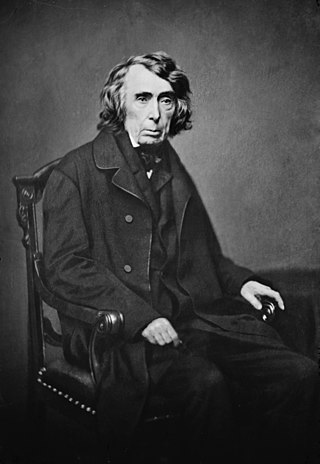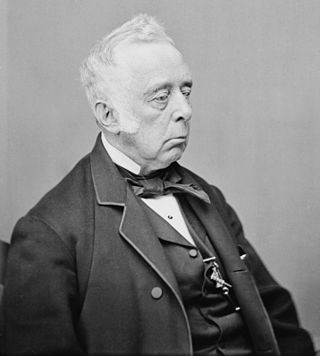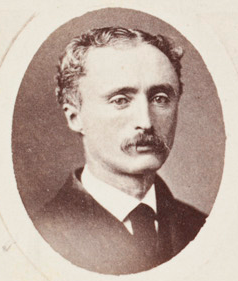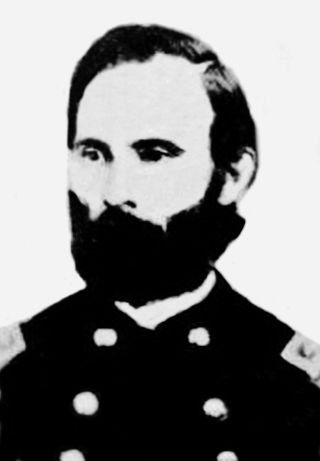
The Emancipation Proclamation, officially Proclamation 95, was a presidential proclamation and executive order issued by United States President Abraham Lincoln on January 1, 1863, during the Civil War. The Proclamation changed the legal status of more than 3.5 million enslaved African Americans in the secessionist Confederate states from enslaved to free. As soon as slaves escaped the control of their enslavers, either by fleeing to Union lines or through the advance of federal troops, they were permanently free. In addition, the Proclamation allowed for former slaves to "be received into the armed service of the United States".

Henry Wilson was an American politician who was the 18th vice president of the United States from 1873 until his death in 1875 and a senator from Massachusetts from 1855 to 1873. Before and during the American Civil War, he was a leading Republican, and a strong opponent of slavery. Wilson devoted his energies to the destruction of "Slave Power", the faction of slave owners and their political allies which anti-slavery Americans saw as dominating the country.

Ex parte Merryman, 17 F. Cas. 144 (No. 9487), was a controversial U.S. federal court case that arose out of the American Civil War. It was a test of the authority of the President to suspend "the privilege of the writ of habeas corpus" under the Constitution's Suspension Clause, when Congress was in recess and therefore unavailable to do so itself. More generally, the case raised questions about the ability of the executive branch to decline enforcement of judicial decisions when the executive believes them to be erroneous and harmful to its own legal powers.
The Radical Republicans were a faction within the Republican Party originating from the party's founding in 1854—some six years before the Civil War—until the Compromise of 1877, which effectively ended Reconstruction. They called themselves "Radicals" because of their goal of immediate, complete, and permanent eradication of slavery in the United States. They were opposed during the war by the Moderate Republicans, and by the Democratic Party. Radicals led efforts after the war to establish civil rights for former slaves and fully implement emancipation. After unsuccessful measures in 1866 resulted in violence against former slaves in the rebel states, Radicals pushed the Fourteenth Amendment for statutory protections through Congress. They opposed allowing ex-Confederate officers to retake political power in the Southern U.S., and emphasized equality, civil rights and voting rights for the "freedmen", i.e., former slaves who had been freed during or after the Civil War by the Emancipation Proclamation and the Thirteenth Amendment.

In the context of the American Civil War (1861–65), the border states were slave states that did not secede from the Union. They were Delaware, Maryland, Kentucky, and Missouri, and after 1863, the new state of West Virginia. To their north they bordered free states of the Union and all but Delaware bordered slave states of the Confederacy to their south.

Reverdy Johnson was an American politician, statesman, and jurist from Annapolis, Maryland. He gained fame as a defense attorney, defending notables such as Sandford of the Dred Scott case, Maj. Gen. Fitz John Porter at his court-martial, and Mary Surratt, alleged conspirator in the assassination of Abraham Lincoln. A former Whig, he was a strong supporter of the Union war effort. At first he opposed wartime efforts to abolish slavery until 1864, and in 1865 supported the 13th Amendment banning slavery.

Benjamin Franklin Butler was an American major general of the Union Army, politician, lawyer, and businessman from Massachusetts. Born in New Hampshire and raised in Lowell, Massachusetts, Butler is best known as a political major general of the Union Army during the American Civil War and for his leadership role in the impeachment of U.S. President Andrew Johnson. He was a colorful and often controversial figure on the national stage and on the Massachusetts political scene, serving five terms in the U.S. House of Representatives and running several campaigns for governor before his election to that office in 1882.

John Adams Dix was an American politician and military officer who was Secretary of the Treasury, Governor of New York and Union major general during the Civil War. He was notable for arresting the pro-Southern Maryland General Assembly, preventing that divided border state from seceding, and for arranging a system for prisoner exchange via the Dix–Hill Cartel, concluded in partnership with Confederate Major General Daniel Harvey Hill.

George Henry Gordon was an American lawyer and a Union general in the American Civil War.

During the American Civil War (1861–1865), Maryland, a slave state, was one of the border states, straddling the South and North. Despite some popular support for the cause of the Confederate States of America, Maryland did not secede during the Civil War. Governor Thomas H. Hicks, despite his early sympathies for the South, helped prevent the state from seceding.

John Gross Barnard was a career engineer officer in the U.S. Army, serving in the Mexican–American War, as the superintendent of the United States Military Academy and as a general in the Union Army during the American Civil War. He served as Chief Engineer of the Army of the Potomac, 1861 to 1862, Chief Engineer of the Department of Washington from 1861 to 1864, and as Chief Engineer of the armies in the field from 1864 to 1865. He also was a distinguished scientist, engineer, mathematician, historian and author.

Samuel Miller Quincy was the 28th mayor of New Orleans and a Union Army officer during the American Civil War.

Edward Winslow Hincks was a career United States Army officer who served as a brigadier general during the American Civil War.

James Allen Hardie was an American soldier, serving in a number of important administrative positions in the Union Army during the American Civil War.

The Price–Miller House is a historic home located in Hagerstown, Washington County, Maryland, United States. It is a 2+1⁄2-story, brick Neoclassical-style townhouse that rests on a high-cut stone foundation, and was built circa 1824–1825.

The Habeas Corpus Suspension Act, 12 Stat. 755 (1863), entitled An Act relating to Habeas Corpus, and regulating Judicial Proceedings in Certain Cases, was an Act of Congress that authorized the president of the United States to suspend the right of habeas corpus in response to the American Civil War and provided for the release of political prisoners. It began in the House of Representatives as an indemnity bill, introduced on December 5, 1862, releasing the president and his subordinates from any liability for having suspended habeas corpus without congressional approval. The Senate amended the House's bill, and the compromise reported out of the conference committee altered it to qualify the indemnity and to suspend habeas corpus on Congress's own authority. Abraham Lincoln signed the bill into law on March 3, 1863, and suspended habeas corpus under the authority it granted him six months later. The suspension was partially lifted with the issuance of Proclamation 148 by Andrew Johnson, and the Act became inoperative with the end of the Civil War. The exceptions to his Proclamation 148 were the States of Virginia, Kentucky, Tennessee, North Carolina, South Carolina, Georgia, Florida, Alabama, Mississippi, Louisiana, Arkansas, and Texas, the District of Columbia, and the Territories of New Mexico and Arizona.

James Bintliff was a colonel in the Union Army during the American Civil War. He briefly commanded brigades for three weeks near the end of 1864 and during most of the crucial month of April 1865. In 1866, he was nominated for appointment as and confirmed as a brevet brigadier general of volunteers in recognition of his conspicuous gallantry during the Third Battle of Petersburg on the final day of the Siege of Petersburg, April 2, 1865. On January 13, 1866, President Andrew Johnson nominated Bintliff for appointment to the grade of brevet brigadier general of volunteers to rank from the final date of the fighting at Petersburg, April 2, 1865. The United States Senate confirmed the appointment on March 12, 1866. In civilian life, Bintliff was one of the founders of The Northwestern Mutual Life Insurance Company. He was editor, publisher and proprietor of three newspapers, one before the Civil War and two after the war. He was a Wisconsin state government official for fourteen years from 1876 to 1891.
The Department of the South was a military department of the United States Army that existed in several iterations in the 19th century during and after the American Civil War.
Adrian Rowe Root was an American commission merchant, warehouse executive, newspaper editor and military officer in the Union Army during the American Civil War. He served as brigade commander for much of the war but his highest actual substantive grade was colonel. His March 2, 1865 nomination for appointment as brevet brigadier general of volunteers to rank from March 2, 1865, was confirmed by the United States Senate on March 9, 1865. His January 13, 1866 nomination for appointment as a brevet major general of volunteers, to rank from March 13, 1865, was confirmed by the U.S. Senate on March 12, 1866.

The Daily Exchange was a daily newspaper published in Baltimore, Maryland, United States from 1858 to 1861. It was originally owned and edited by Charles G. Kerr and Thomas Hall Jr. In 1859, Henry Fitzhugh, William Carpenter, and Frank Key Howard bought into the paper. Howard soon headed the editorial staff and Severn Teackle Wallis contributed editorial columns frequently.

















